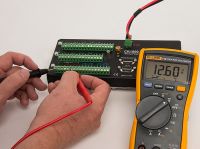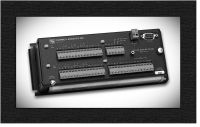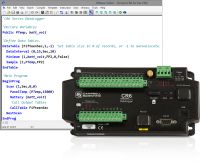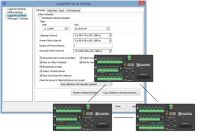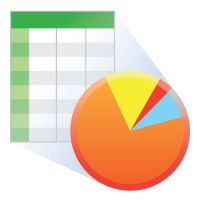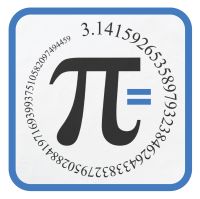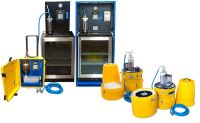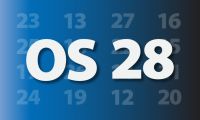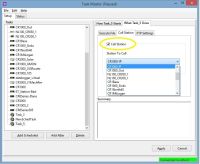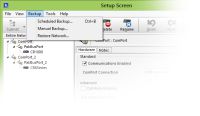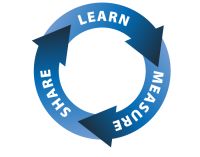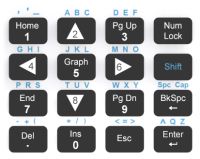The Campbell Scientific Blog Your source for useful how-to information and helpful expert advice
Displaying 141 - 160 of 162 articles
6 Steps to Determine if Your Data Logger Needs Repairing
Author: Jason Ritter | Last Updated: 09/16/2015 | Comments: 2
Is your data acquisition system recording incorrect measurements, but you’re unsure of the cause? Do you wonder if your data logger may need to be repaired? This article discusses some simple tests that you can perform to help determine if your data logger has a... read moreMaking Sense of an Edlog Program File for Your Retired Data Logger
Author: Janet Albers | Last Updated: 09/09/2015 | Comments: 0
Our retired data loggers are still in use, and some of them use the Edlog programming language. Do you have an Edlog data logger with a .dld compiled program file that you don’t know how to read? Does your .dld file have codes that you... read moreWhy Modbus Matters: An Introduction
Author: Paul Smart | Last Updated: 09/02/2015 | Comments: 2
You may have heard of Modbus (a widely used communications protocol), but do you know why it is often used with Campbell Scientific data loggers? Do you know how to use Modbus for communication between your data loggers and other Modbus-capable devices? Modbus is just one... read more5 Things to Know before Discussing Your Data Logger Programming Issue
Author: Janet Albers | Last Updated: 08/26/2015 | Comments: 0
If you need help programming a Campbell Scientific data logger, here are some things you can do to have a more productive conversation with a Customer Support and Implementation Engineer. At a minimum you’ll want to know: What data logger you’re working with—such as a CR6, CR1000,... read moreSimplify Your LoggerNet Network Setup Using LoggerNet Defaults
Author: Dana Worley | Last Updated: 08/19/2015 | Comments: 0
Configuring a network of data loggers for communication and data collection in LoggerNet's Setup window can seem like an arduous and tedious task, but it doesn’t have to be. It’s true that you need to complete this task before you can use LoggerNet to connect... read moreCRBasic Tips to Simplify Data Post-Processing
Author: Barbra Utley | Last Updated: 08/12/2015 | Comments: 3
You’ve collected your measurement data, but how do you easily make sense out of it? How can you simplify the post-processing of your data and start analyzing it sooner? In this article, I’ll explain how adding some code to your CRBasic program can save you... read moreThe Benefits of Using Constants in CRBasic
Author: Janet Albers | Last Updated: 08/05/2015 | Comments: 0
Why should you use a Constant declaration in your CRBasic program? What is a Constant anyway? In a previous article ("Going Public with Your Variables in CRBasic"), we talked about the Public and Dim variable declarations. Variables are just that—variable; they change. Constants, on the other hand, don’t change;... read moreAutomatic Water Sampler Maintenance Tips
Author: Robin Deissinger | Last Updated: 07/29/2015 | Comments: 1
If you use automatic water-sampling equipment, consider performing a maintenance check-up during the month of August, which is National Water Quality Month in the U.S. When you perform a maintenance check-up, you can help ensure that your equipment is operating at an optimal level and that you... read more4 New Ways to Use Array Notation: Copying or Transposing
Author: Janet Albers | Last Updated: 07/21/2015 | Comments: 0
Copying or transposing has become easier with OS 28 (CR6 OS 1). This new operating system enables you to copy portions of an array to a new location, such as when transposing rows and columns. In this example we start with A(3,2) (3 rows, 2 columns) initialized as... read more4 Ways to Make Your Data More Secure
Author: Jacob Davis | Last Updated: 07/15/2015 | Comments: 0
Your data is valuable, and sometimes that value is reduced if unauthorized users have access to it. For this reason, Campbell Scientific data loggers have numerous methods of restricting access to your data. This article is an overview of four available methods for securing your... read moreTroubleshooting Best Practices for Data Acquisition Systems
Author: Jason Ritter | Last Updated: 07/08/2015 | Comments: 0
Are your current troubleshooting methods not as helpful as you’d like them to be? This article discusses a number of troubleshooting best practices you can use, which may help you determine the source of the problem and resume your data collection more quickly. When I... read more4 New Ways to Use Array Notation: Complex Scaling
Author: Janet Albers | Last Updated: 07/01/2015 | Comments: 0
You can perform more complex scaling in an array without needing a For/Next loop. To take advantage of this feature, use OS 28 (CR6 OS 01) or later. In this example program, a unique set of multipliers and offsets is applied to the column of an... read moreHow to Prevent Skipped Scans and a Sunburn
Author: Jacob Davis | Last Updated: 06/17/2015 | Comments: 3
Through programming, relatively slow SDI-12 measurements can coexist, without problems, alongside fast measurements. To illustrate the need for accommodations in your data logger program, I will share the story of the worst sunburn I ever got. Southern Peru is near the Pacific Ocean, yet is... read more4 New Ways to Use Array Notation: Initializing Multi-Dimensional Arrays
Author: Janet Albers | Last Updated: 06/10/2015 | Comments: 0
Initializing variables within an array is more flexible than ever with OS 28 (CR6 OS 1). You can think of a single dimensioned array as numbers in a column. Two dimensions, in comparison, puts numbers in rows and columns. The third dimension is a page. For example:... read moreMake Your LoggerNet Data Collection More Flexible
Author: Dana Worley | Last Updated: 06/03/2015 | Comments: 0
If you are a user of our LoggerNet software, you know that the software can be configured to collect data from your data logger on a regular interval. From a data logger's Schedule tab in the Setup Screen, you can configure an interval of anywhere... read more6 Common Communication Problems Involving Serial Connections
Author: Jacob Davis | Last Updated: 05/29/2015 | Comments: 9
Your data logger may record great data, but if you can't retrieve it, the data isn’t going to do you much good. To ensure your successful data retrieval, it’s essential that you can troubleshoot possible problems that may arise with PC-to-data-logger communication over a serial... read moreHow to Check the Accuracy of Your Solar Radiation Measurements
Author: Bruce Smith | Last Updated: 05/29/2015 | Comments: 0
Solar radiation is an important measurement for many researchers and those who are monitoring their evapotranspiration values for irrigation purposes. If you have been wondering how accurate your solar radiation measurement is, Apogee Instruments (an associated company of Campbell Scientific) has a Clear Sky Calculator mobile... read moreHow Safe Is Your LoggerNet Data?
Author: Dana Worley | Last Updated: 05/29/2015 | Comments: 0
When you live in a cold-weather climate like we do here in northern Utah, it’s a welcome reprieve to spend a few days away enjoying someplace sunny and warm. A couple of days ago, as I was uploading photos of sunshine and blue skies from... read moreWelcome to the Campbell Scientific Blog
Author: Robin Deissinger | Last Updated: 05/29/2015 | Comments: 0
Which of these sounds like you? I need help with the basic stuff. How do I know what kind of measurement equipment I need? When I get it, how do I set it up correctly? I need programming help. How do I make sure I'm getting... read moreHow to Find and Insert Characters Using a Keyboard Display
Author: Janet Albers | Last Updated: 05/29/2015 | Comments: 0
A keyboard display, such as the external CR1000KD or on-board display of the CR850 and CR3000, is a powerful tool you can use in the field. A keyboard display enables you to interrogate and program a data logger independent of other telecommunication links. Most keys on... read more










